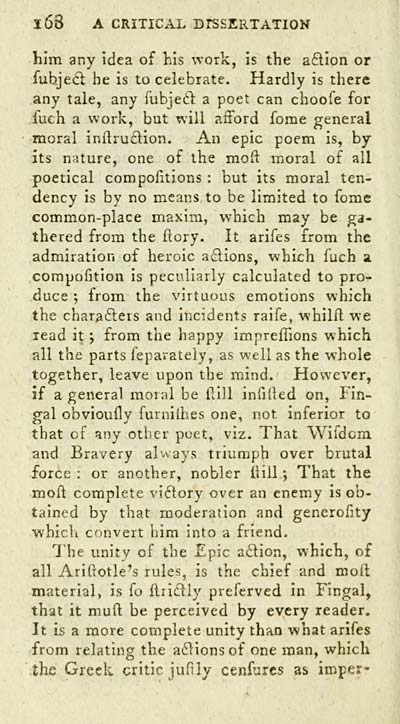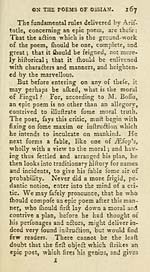Ossian Collection > Poems of Ossian > Volume 3
(176)
Download files
Complete book:
Individual page:
Thumbnail gallery: Grid view | List view

1 63 A CRITICAL DrSSERTATION
him any idea of his work, is the a£lion or
fuhjecl he is to celebrate. Hardly is there
any tale, any fubjedl: a poet can choofe for
luch a work, but will aitord fome general
moral indruclion. An epic poem is, by-
its n;!ture, one of the moft moral of all
poetical compoiitions : but its moral ten-
dency is by no means to be limited to fome
common-place maxim, which may be ga-
thered from the ftory. It arifes from the
admiration of heroic a6lions, which fuch a
compofition is peculiarly calculated to pro-
duce ; from the virtuous emotions which
the characters and incidents raife, whilfl we
lead it j from the happy impreflions which
all the parts fepaiately, as well as the whole
together, leave upon the mind. However,
if a general moial be Hill infilled on, Fin-
gal obvioufly furnilhes one, not inferior to
that of any other poet, viz. That Wifdom
and Bravery always triumph over brutal
force: or another, nobler iiill *, That the
moil complete victory over an enemy is ob-
tained by that moderation and generofity
which convert him into a friend.
The unity of the £pic adion, which, of
all Ariftotle's rules, is the chief and moil;
material, is fo flridly preferved in Fingal,
that it muft be perceived by every reader.
It is a more complete unity than what arifes
from relating the adlions of one man, which
the Greek critic jufily cenfurcs as imper-
him any idea of his work, is the a£lion or
fuhjecl he is to celebrate. Hardly is there
any tale, any fubjedl: a poet can choofe for
luch a work, but will aitord fome general
moral indruclion. An epic poem is, by-
its n;!ture, one of the moft moral of all
poetical compoiitions : but its moral ten-
dency is by no means to be limited to fome
common-place maxim, which may be ga-
thered from the ftory. It arifes from the
admiration of heroic a6lions, which fuch a
compofition is peculiarly calculated to pro-
duce ; from the virtuous emotions which
the characters and incidents raife, whilfl we
lead it j from the happy impreflions which
all the parts fepaiately, as well as the whole
together, leave upon the mind. However,
if a general moial be Hill infilled on, Fin-
gal obvioufly furnilhes one, not inferior to
that of any other poet, viz. That Wifdom
and Bravery always triumph over brutal
force: or another, nobler iiill *, That the
moil complete victory over an enemy is ob-
tained by that moderation and generofity
which convert him into a friend.
The unity of the £pic adion, which, of
all Ariftotle's rules, is the chief and moil;
material, is fo flridly preferved in Fingal,
that it muft be perceived by every reader.
It is a more complete unity than what arifes
from relating the adlions of one man, which
the Greek critic jufily cenfurcs as imper-
Set display mode to: Large image | Transcription
Images and transcriptions on this page, including medium image downloads, may be used under the Creative Commons Attribution 4.0 International Licence unless otherwise stated. ![]()
| Early Gaelic Book Collections > Ossian Collection > Poems of Ossian > Volume 3 > (176) |
|---|
| Permanent URL | https://digital.nls.uk/77527086 |
|---|
| Description | Volume III. |
|---|---|
| Shelfmark | Oss.41 |
| Attribution and copyright: |
|
| Description | London : printed for J. Mundell & Co. Edinburgh; and for J. Mundell, Glasgow, 1796. In 3 volumes. |
|---|---|
| Shelfmark | Oss.39-41 |
| Additional NLS resources: | |
| Description | Selected books from the Ossian Collection of 327 volumes, originally assembled by J. Norman Methven of Perth. Different editions and translations of James MacPherson's epic poem 'Ossian', some with a map of the 'Kingdom of Connor'. Also secondary material relating to Ossianic poetry and the Ossian controversy. |
|---|
| Description | Selected items from five 'Special and Named Printed Collections'. Includes books in Gaelic and other Celtic languages, works about the Gaels, their languages, literature, culture and history. |
|---|

